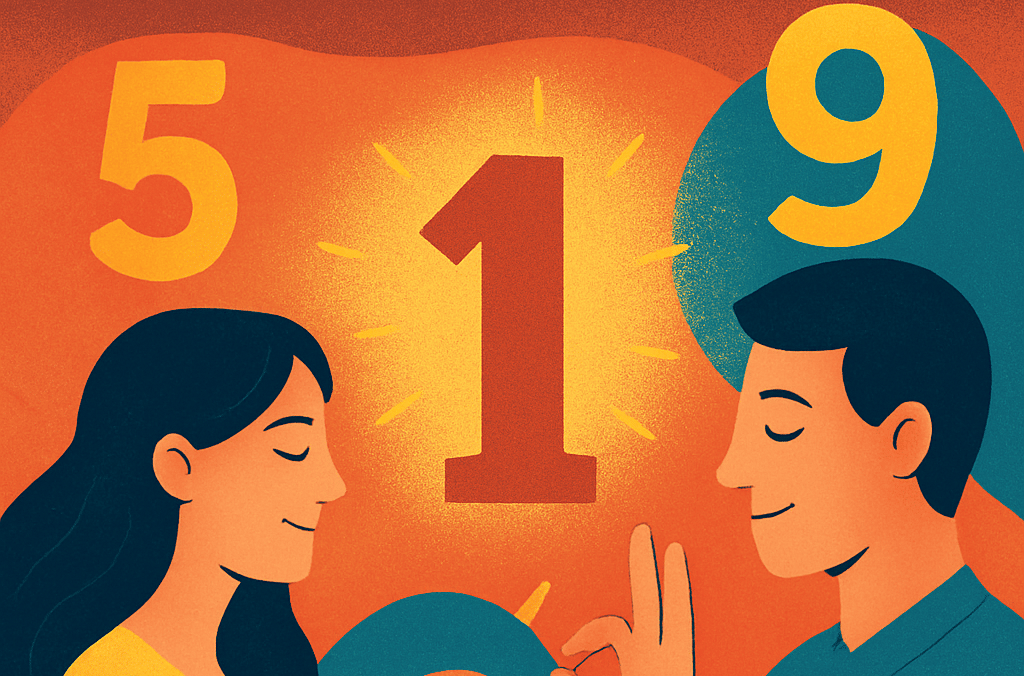Psychology numbers explore the way single digits shape the psyche
how they slip into thought, behavior, even destiny. Each numeral, from 1 through 9, hums with archetypal power: 4 fortifies, 8 empowers, 7 soothes. Whether through biology or culture, their pull is undeniable.
9/17/20253 min read


Why does 1 feel like a spark of independence, urging you to blaze your own trail? Why does 5 make you itch for adventure, while 9 wraps you in compassion?
Welcome to the world of psychology numbers—the study of how single digits slip beneath our awareness and quietly shape the way we think, feel, and act. These aren’t just symbols on a page. They are archetypes that whisper to our brains, color our culture, and even nudge the paths we take in life.
A Primer: Sparks of the Single
Think of psychology numbers as the soul of digits. Each from 1 through 9 carries a unique psychological flavor.
1 = independence, new beginnings, the lone pioneer.
4 = structure, stability, reliability.
8 = power, ambition, influence.
From the moment a baby first recognizes shapes and counts fingers, numbers become more than math. They carry emotion, identity, and myth. Different societies highlight different meanings—yet the fascination is universal.
From Brain to Belief: Where Numbers Live
Numbers don’t just float in abstract space. They have an address in your brain. Neuroscience shows that the parietal lobe helps us process numerical sense. But numbers also fire up emotional areas: the digits we favor or fear can trigger stress, comfort, or awe.
Culture paints over this biology. In China, 8 radiates wealth and prosperity, influencing everything from wedding dates to phone numbers. In the West, 7 often feels magical or lucky, its rarity inspiring wonder. Together, brain and culture create a double impact—nature provides the base, culture adds the color.
Digit Deep-Dive: Who They Are in Us
Let’s look at a few standout numbers and the psychological portraits they draw:
1: The Trailblazer – Bold, driven, sometimes solitary. Think of leaders who thrive when carving their own way.
5: The Explorer – Restless, curious, craving change. This is the friend who books last-minute flights and loves shaking things up.
9: The Humanitarian – Empathetic, wise, big-hearted. They see the world as a family and want to leave behind a legacy of love.
Every digit has both a gift and a challenge. A 1 may inspire but also struggle with isolation. A 5 may bring excitement but also chaos. A 9 may uplift but risk self-sacrifice.
Ripple Effects: Where Digits Make a Difference
Psychology numbers ripple across fields we might not expect.
Therapy: Patients with phobias have found calm through the symbolism of 7, reframing fear into a source of solace.
Marketing: Companies often lean on culturally powerful digits—notice how “8” appears in product names or phone numbers in Asia.
Everyday Life: People unconsciously choose apartment numbers, passwords, or even wedding dates that “feel right.”
Our minds are rarely neutral about numbers. They are quiet influencers, woven into both healing and commerce.
Q&A: Pearls from the Psychology of Numbers
Q: Are psychology numbers innate or cultural?
A: Both. Biology wires our number sense, but culture teaches what each digit means. The two amplify each other—like a “3” child’s natural creativity blooming even more in a society that celebrates expression.
Q: Which number is best for life enhancement?
A: Many point to 3, the number of creators. It represents joy, play, and connection—all crucial antidotes to modern stress. Research even suggests people who resonate with “3 energy” report higher happiness and social fulfillment.
Q: How can I use my psychology number daily?
A: Anchor small rituals to your number. A “1” might start the day with a solo goal. A “7” might end the evening with quiet reflection. A “5” might try one new habit each week. Over time, these practices turn abstract symbolism into tangible growth.
Q: What does science say?
A: Far from superstition, science shows numbers light up both logical and emotional brain regions. Primes like 7 spark awe. Repeated digits bias our choices. The field is evolving from lore into a laboratory-tested tool for understanding cognition.
Q: How can therapy apply psychology numbers?
A: By reframing traits. A “4,” often seen as rigid, can be taught to view structure as a path to freedom. Therapists using number archetypes in CBT report reductions in cognitive bias, while self-help practices turn “limitations” into strengths.
Closing Thought: One Number, One You
Numbers enchant because they feel both intimate and universal. They are cosmic codes and personal mirrors. Whether you find yourself in the boldness of 1, the curiosity of 5, or the compassion of 9, your number offers a lens to re-see yourself.
So the next time a single digit catches your eye, pause. Listen.
One number. One psyche. One you.
